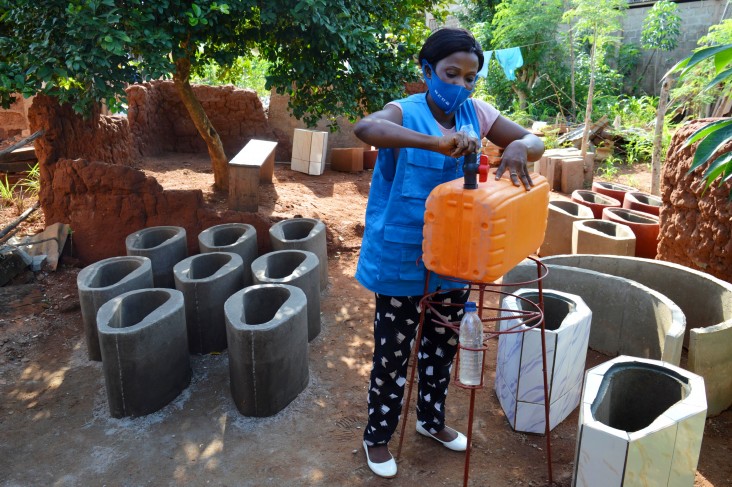Speeches Shim

How Beninese entrepreneurs created a market for products that prevent COVID-19 and promote good health for years to come
Aimée Gbahoué has a busy week ahead. Surrounded by sacks of sand, cement, and orange and blue-colored recycled plastic jugs, she quickly moves about at her open-air workshop in Aplahoué, Benin. With just a few handheld tools, she pours concrete, fits water taps, and bends iron rods over red-hot embers under the West African sun.
Gbahoué is building toilets, latrine parts, and handwashing stations under the brand WC Mimin, which she sells and installs for customers in their homes. She’s one of 40 entrepreneurs in Benin supported by the USAID Sanitation Service Delivery (SSD) activity. Over the past few years, the SSD activity has empowered entrepreneurs to start their own business and provided people with affordable latrines and easy access to handwashing at home and in local shops.
Benin has one of the lowest rates of access to sanitation in the world. Only 11 percent of homes have their own facility for hand hygiene—a striking statistic even before the COVID-19 pandemic. Currently, sanitation products are hard to find and out of reach for people living in poverty.

As the coronavirus spread in Benin, Gbahoué and her fellow entrepreneurs realized that their handwashing station—normally fixed to a latrine wall—could be adapted and sold on its own. They started producing a new free-standing model that is larger, sturdier, and sits on a metal stand for use in public areas like shops and offices. The new model can operate with a foot pedal, allowing people to wash their hands without touching the tap. Additionally, the entrepreneurs are producing face masks and working with a local university to market hand sanitizers and household disinfectants.
“When COVID-19 arrived, I took the initiative to produce handwashing stations that I showcased at my house. Now I easily sell at least 15 handwashing stations a week,” said Igor Baimey, an entrepreneur in the town of Akpro-Missérété.
The new products are a lifeline for many entrepreneurs, whose toilet and latrine sales have dipped during the pandemic. Besides placing posters and going door-to-door to advertise their products, they are installing handwashing stations in public places like markets and giving live demonstrations. In providing this public service, they hope to improve hand hygiene in high-traffic areas while demonstrating the value of their products.
“What I want to do is to raise awareness [of healthy practices] and take the opportunity to talk about hygiene and sanitation products and handwashing,” added Gbahoué.
By training and equipping private suppliers, USAID is reinforcing the importance of handwashing and creating a more sustainable market for affordable sanitation and hygiene products in Benin. Beyond the threat of COVID-19, USAID is closing the sanitation and hygiene gap and nurturing local businesses for the future.
And for Aimée Gbahoué, that future is looking bright.
“Before Sanitation Service Delivery, I did not install toilets, taps or tiles. I can say that this has improved [my family’s] financial situation. My financial difficulties have been reduced, compared to before when I was a [promoter] for another entrepreneur,” Gbahoué said.
Like the other entrepreneurs, Gbahoué is looking to weather the COVID-19 pandemic, secure her livelihood, and support her family. With help from USAID, she is doing just that—and promoting good health in her community too.
About USAID/West Africa Sanitation Service Delivery
USAID/West Africa Sanitation Service Delivery (SSD) develops and tests scalable market-based solutions to improve sanitation and hygiene outcomes among people living in poverty in cities across Benin, Côte d’Ivoire, and Ghana.
In Benin, SSD is training and equipping entrepreneurs to market toilets constructed with the Satopan, manufacture handwashing stations, and promote services for safely treating and disposing waste. The entrepreneurs also offer access to consumer financing and educate their customers about the health benefits of improved sanitation and hygiene.

Comment
Make a general inquiry or suggest an improvement.